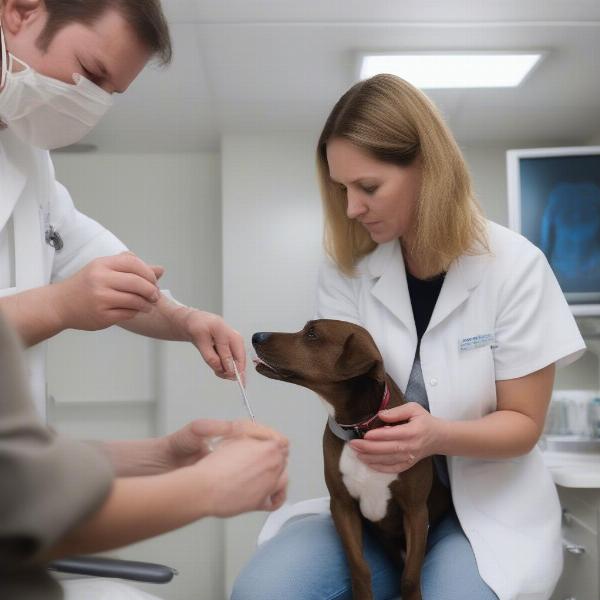Worming a pregnant dog is a crucial aspect of prenatal care, directly impacting the health of both the mother and her future puppies. It’s essential to understand the specific considerations and safe practices involved in deworming during this delicate period. This guide provides comprehensive information to help you make informed decisions and ensure the well-being of your expectant canine companion and her litter.
Understanding the Importance of Worming During Pregnancy
Intestinal parasites can pose significant risks to pregnant dogs and their unborn puppies. Worms can deprive the mother of essential nutrients, weakening her immune system and potentially affecting fetal development. Some parasites can even be transmitted to puppies in utero or through the mother’s milk, leading to health complications in the vulnerable newborns. Therefore, a strategic worming protocol is vital for a healthy pregnancy and a thriving litter.
What are the most common worms found in pregnant dogs? Roundworms, hookworms, whipworms, and tapeworms are common culprits. These parasites can cause a range of issues, from mild digestive upset to more serious conditions like anemia and stunted growth.
Safe Deworming Practices for Pregnant Dogs
Choosing the right dewormer and administering it correctly is paramount during pregnancy. Not all deworming medications are safe for pregnant or lactating dogs. Always consult with your veterinarian to determine the most appropriate dewormer, dosage, and timing for your specific dog’s breed, age, and health condition. They can recommend a product that effectively targets the prevalent parasites in your area while minimizing any potential risks to the mother and puppies.
When should you deworm a pregnant dog? Your veterinarian might recommend deworming several times during pregnancy, typically starting around week four or five of gestation. This helps to eliminate existing worms and prevent new infestations. They may also advise deworming again after the puppies are born to protect both the mother and her nursing litter.
 Safe Deworming Practices for Expecting Canines
Safe Deworming Practices for Expecting Canines
Recognizing the Signs of Worms in Pregnant Dogs
Even with preventative deworming, it’s crucial to monitor your pregnant dog for signs of worm infestation. These signs can include vomiting, diarrhea, weight loss, a pot-bellied appearance, lethargy, and changes in appetite. If you notice any of these symptoms, consult your veterinarian immediately. Early detection and treatment are crucial for preventing complications.
Natural Deworming Options for Pregnant Dogs
Some pet owners prefer natural deworming methods for their pregnant dogs. While certain natural remedies, such as pumpkin seeds and diatomaceous earth, may have some effectiveness against worms, it’s essential to discuss these options with your veterinarian before using them. They can assess the safety and efficacy of these remedies for your specific dog and advise on the appropriate dosage and usage. Remember, relying solely on natural remedies may not provide adequate protection against all types of worms, especially during pregnancy when the stakes are higher.
Conclusion
Worming your pregnant dog is a vital part of responsible pet ownership. By working closely with your veterinarian and following a tailored deworming plan, you can protect your dog and her puppies from the harmful effects of intestinal parasites, ensuring a healthy start in life for the entire litter. Remember, proactive parasite control is always the best approach.
FAQs
- How often should I worm my pregnant dog? Consult your veterinarian for a personalized schedule, as frequency depends on various factors.
- Can I use over-the-counter dewormers? It’s safest to use veterinarian-prescribed dewormers during pregnancy.
- What are the signs of worms in puppies? Puppies with worms may exhibit pot-bellied appearance, diarrhea, vomiting, and poor growth.
- Are all dewormers safe for pregnant dogs? No, not all dewormers are safe. Consult your vet.
- Can I prevent my dog from getting worms? Regular vet check-ups, proper hygiene, and fecal testing are key to prevention.
- Can worms affect my dog’s milk supply? Yes, worms can potentially impact milk production and quality.
- Is it safe to handle dog feces during pregnancy? Wear gloves and wash your hands thoroughly to minimize risks.
Related Articles
- durvet 2251171 wormer-double strength liquid dog
- spot on dewormer for dogs
- dosage for praziquantel for dogs
- valbazen for dogs
ILM Dog is your trusted resource for comprehensive dog care information. We offer expert advice on dog breeds, health, training, nutrition, grooming, and much more. From choosing the right breed to providing the best possible care throughout your dog’s life, ILM Dog is here to support you every step of the way. We specialize in Dog Breed Selection, Health & Medical Care, Training & Behavior, and Nutrition & Feeding. For any questions, contact us at [email protected] or +44 20-3965-8624.